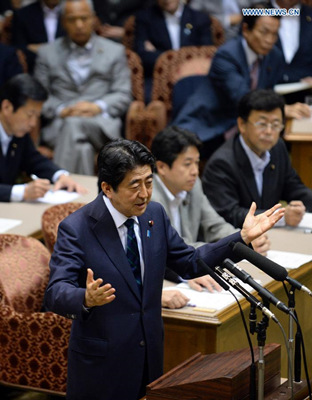
Japanese Prime Minister Shinzo Abe gestures as he speaks during a Diet debate among the parties' heads in Tokyo on June 17, 2015. (Photo: Xinhua/Ma Ping)
Japanese Prime Minister Shinzo Abe on Wednesday failed to defend himself over the controversial security bills he pushed hard amid poignant inquires and fierce criticism from opposition parties' leaders during a Diet debate among the parties' heads.
Shunning from directly answering questions fired by opposition parties' leaders over the constitutionality of the so-called "war bills", the prime minister insisted that the security legislation is fully in line with the country's war-renouncing constitution, citing the controversial 1959 Sunagawa judgment.
In 1959, the Japanese Supreme Court nullified a Tokyo District Court's rule which stated U.S. base in Japan violated the country' s Constitution and the supreme court said that to host U.S. base in Japan, according to the Japan-U.S. defense treaty, is constitutional based on a country's nature right to defend itself for existence through "necessary defensive means."
The Japan's ruling Liberal Democratic Party headed by Abe quibbled that the "necessary defensive means" in the 1959 rule did not distinguish individual defense from collective defense and since the security environment surrounding Japan changed, therefore the right to collective defense should be exercised by Japan at the same time.
However, a prominent constitutional scholar here Yasuo Hasebe, professor of constitutional law at Waseda Law School, explained that the Sunagawa case discussed about Japan's individual self- defense and U.S. collective defense in the Japan-U.S. alliance treaty, rather than Japan's collective defense. "I think almost all constitutional scholars in Japan would support me in the Sunagawa case.. and Japan's collective defense was not an issue at all in the case," Hasebe said Monday in a press conference.
The scholar, who was recommended by the LDP to testify the constitutionality of the security bills but made "unconstitutional " conclusion, strongly slammed the LDP politicians as "lack basic knowledge of law".
During Wednesday's debate, the second one over the constitutionality of the war bills, Katsuya Okada, chief of Japan' s largest opposition party the Democratic Party of Japan, said that the new security legislation violates Japan's Constitution, adding that if the legislation was passed, any Japanese government and leaders could lift the constitutional bans over conscription system in Japan through reinterpreting Constitution like Abe.
Chief of the Japanese Communist Party Kazuo Shii criticized that Abe's argument that logistic support provided by Self-Defense Forces (SDF) to other countries will be limited in safe areas is " unrealistic," "irrational" and "illogical."
He also said that it is an international military common sense that the logistic support is a part of a combat, counter firing against Abe's statement the SDF's logistic support to a certain country would not be integrated into the country's use of force.
Yorihisa Matsuno, head of the Japan Restoration Party, said his party will not compromise with the government over amending the new legislation, brushing away recent concerns that the party will tie up with LDP on the new legislation after a meeting between Abe and the party's top consultant Toru Hashimoto.
The Japanese pacifist Constitution bans the country from dispatching its SDF overseas to engage in armed conflicts and to help defense other countries, but the Abe's administration allowed the SDF to exercise the right to collective self-defense through reinterpreting the Constitution and thereafter pushing forward the new security legislation to lay "legal" basis for the SDF's enlarged role.
A latest poll released late Monday covering Japan's 198 constitutional scholars showed that only three out of 149 who responded to the survey said the legislation is "constitutional," meaning that about 98 percent of the experts thought the security bills are "unconstitutional."
Meanwhile, over 3,000 Japanese scholars from different research areas, including Nobel laureates, urged the government to abolish the unconstitutional security bills. "If the Abe administration would force this policy without amending the constitution, that would be the beginning of tyranny, that is a destruction of the rule of law," said a professor emeritus at Keio University Setsu Kobayashi who is among the thousands of experts.
Abe on Wednesday reiterated that the ruling coalition will seek the passage of the unconstitutional bills within the current Diet session which will end on June 24, but the ruling bloc is mulling to delay the session due to pressure from the opposition parties and the public.
About 81.4 percent of the population here believe the government's explanations about the security-related bills are " not sufficient," while only 14.2 percent feel the opposite.
















































